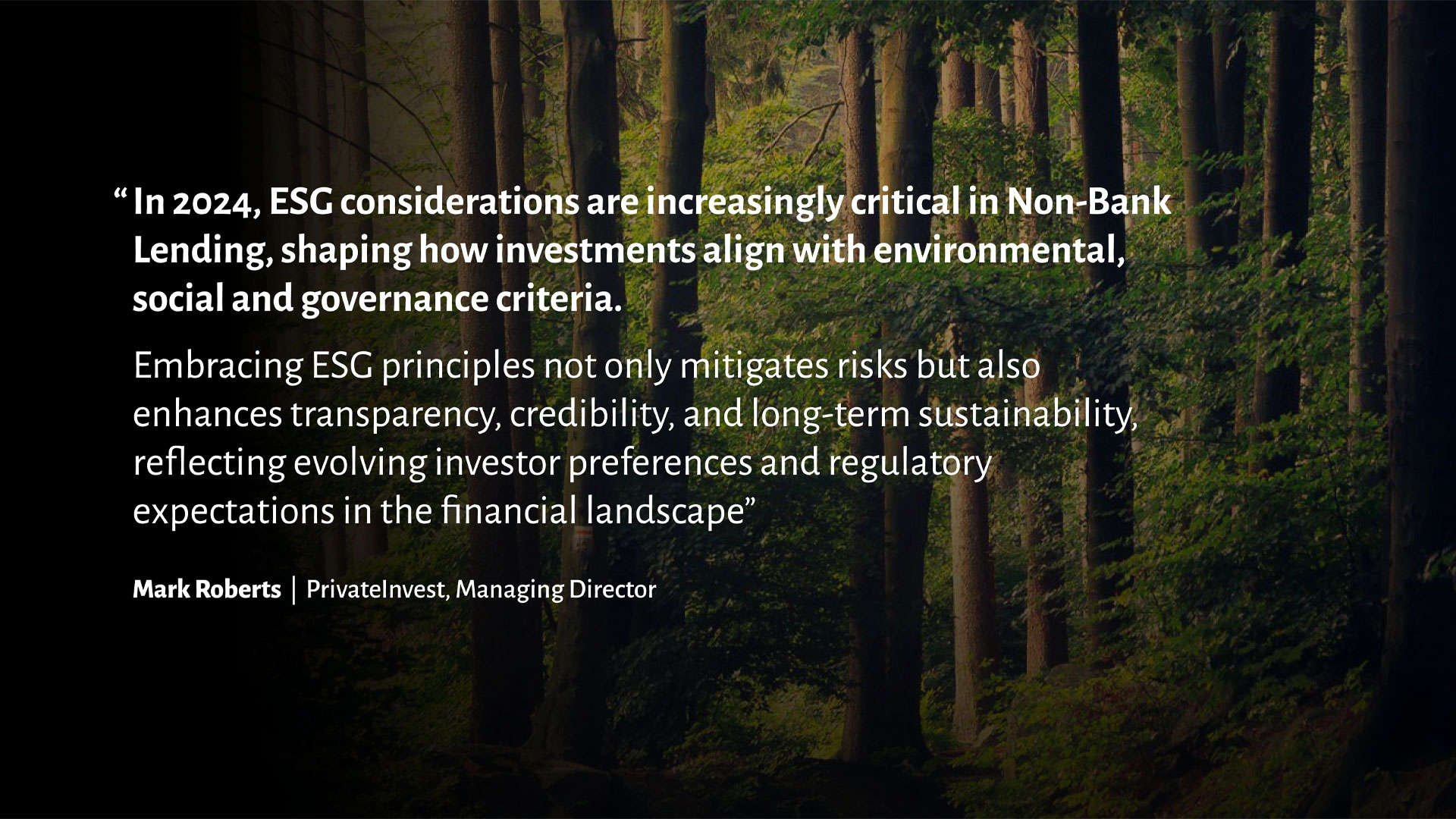Why Non Bank Lenders are Turning to ESG
In recent years, ESG has become a crucial focus for many financial institutions. While ESG considerations have traditionally been associated with banks and large investment firms, Non Bank Lenders are increasingly recognising the importance of integrating these principles into their operations. This shift is driven by several key factors that highlight why ESG is on the rise for Non Bank Lenders.
What is ESG?
Environmental, Social, and Governance (ESG) refers to criteria Non Bank Lenders use to evaluate the sustainability and ethical impact of investments in companies. This criteria helps assess how companies perform in non-financial areas that affect long-term success and societal impact.

Environmental
- Climate Change: Measures carbon emissions and energy use.
- Resource Management: Focuses on sustainable use of natural resources.
- Pollution and Waste: Addresses waste management and pollution control.
- Biodiversity: Evaluates impact on ecosystems and wildlife.
Social
- Labor Practices: Examines employee treatment, wages, and safety.
- Community Relations: Assesses impact on local communities and engagement.
- Human Rights: Ensures respect for human rights in operations and supply chains.
- Diversity and Inclusion: Looks at efforts to promote workplace diversity and inclusion.
Governance
- Board Composition: Evaluates diversity and expertise of the board.
- Executive Compensation: Considers alignment of pay with performance.
- Ethical Conduct: Reviews adherence to ethical practices and transparency.
- Shareholder Rights: Ensures respect for shareholder engagement and rights.
ESG criteria are used by investors, companies, and regulators to manage risks, drive value, and promote corporate responsibility, contributing positively to society and the environment.
ESG for Non Bank Lenders
Growing Investor Demand for ESG
One of the primary drivers of ESG adoption by Non Bank Lenders is the growing demand from investors. More than ever, investors are seeking opportunities that align with their values and contribute positively to society and the environment. ESG compliant investments are seen to mitigate risks and ensure long-term sustainability. Non Bank Lenders who integrate ESG criteria can attract a broader base of investors looking for responsible and sustainable investment opportunities.
Regulatory Pressure in Non Bank Lending
Regulatory bodies worldwide are increasingly focusing on ESG standards. Governments and regulatory authorities are implementing policies and guidelines to ensure that financial institutions, including Non Bank Lenders, adhere to ESG principles. Compliance with these regulations is not only a legal requirement but also enhances the reputation of Non Bank Lenders, therefore positioning them as responsible and forward-thinking entities.
Risk Management for Non Bank Lenders
ESG integration is essential for effective risk management. Environmental risks, such as climate change, and social risks, such as labour practices and community impact, can significantly affect the financial performance of loans and investments. By incorporating ESG criteria, Non Bank Lenders can identify and mitigate these risks early, therefore ensuring more stable and sustainable returns.
ESG: A Competitive Advantage
In a competitive financial landscape, Non Bank Lenders that prioritize ESG can differentiate themselves from their peers. ESG focused lenders are perceived as more ethical and responsible, which can enhance their brand value and attract both clients and investors. This competitive edge can lead to increased market share and therefore, better financial performance in the long run.
Stakeholder Expectations in Non Bank Lending
Customers, employees, and other stakeholders are increasingly prioritising ESG factors in their decision-making processes. Non Bank Lenders that adopt ESG principles can better meet the expectations of these stakeholders, fostering stronger relationships and enhancing their overall reputation. This alignment with stakeholder values, consequently leading to increased loyalty and support.
Technological Advancements in Non Bank Lending
Advances in technology have made it easier for Non Bank Lenders to incorporate ESG criteria into their operations. Tools and platforms that provide ESG data and analytics enable lenders to assess the ESG performance of potential investments more accurately. These technological innovations facilitate the integration of ESG principles, thus making it a more accessible and manageable process for Non Bank Lenders.
ESG: Long-Term Value Creation
Ultimately, ESG integration in Non Bank Lending is about creating long-term value. By considering the environmental, social, and governance aspects of their operations, non-bank lenders can ensure sustainable growth and profitability. ESG compliant practices contribute to a more stable and resilient financial system, as a result, benefiting not only the lenders themselves but also the broader economy and society.
Conclusion
The rise of ESG in Non Bank Lending is a testament to the growing recognition of the importance of responsible and sustainable finance. Driven by investor demand, regulatory pressure, risk management needs, competitive advantage, stakeholder expectations, and technological advancements, Non Bank Lenders are increasingly embracing ESG principles. However this shift not only enhances their reputation and market position but also contributes to long-term value creation, thus a more sustainable future.
PrivateInvest: Making A Positive Difference
ESG (Environmental, Social, and Governance) or impact investments are increasingly popular due to their multifaceted benefits. These investments not only generate financial returns but also align with investors’ values, fostering sustainable practices. They promote responsible corporate behaviour, leading to a cleaner environment and ethical governance. Furthermore, ESG/impact investments often demonstrate resilience during market downturns, reducing risk. Ultimately, they contribute to addressing pressing global issues like climate change and social inequality, making them a compelling choice for socially conscious investors.
Leveraging our strong track record in delivering social and affordable housing and our acknowledged commitment to environmental, social, and governance practices, PrivateInvest aims to harness its capacity to create a positive impact on local Australian communities. Our corporate policy, among other things, includes having Non-Executive Directors and an Investment Review Committee. Pitcher Partners Auditors audit our Fund accounts annually; this is not a requirement as we are not a retail fund, however, provides further governance on our wholesale Funds. PrivateInvest is continually sourcing opportunities within the impact investment sector.

About PrivateInvest
PrivateInvest is an Australian Investment Fund Manager + Private Commercial Credit Partner / Non Bank Lender to the Property Sector providing a suite of bespoke financial services to investors and borrowers.
Wholesale Investors rely on PrivateInvest to deliver above average risk altered returns in the commercial real estate debt market. We achieve this through equity, mezzanine debt, preferred equity, and hybrid debt instruments.
Qualified borrowers in the middle market segment access capital from PrivateInvest for tailored property financing. PrivateInvest provides support and personalised solutions that borrowers “can bank on”.
Share your thoughts on Why Non-Bank Lenders are Turning to ESG via your social channels with the button below.